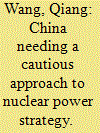| Srl | Item |
| 1 |
ID:
088245


|
|
|
|
|
| Publication |
2009.
|
| Summary/Abstract |
China is leading the recent revival of nuclear energy programs. The Chinese government plans to increase nuclear generating capacity to 40 GWe by 2020, while the installed capacity is 8.6 GWe in 2007. In view of the enthusiasm shown for nuclear electricity throughout the country, the actual scale of Chinese nuclear power development is expected to reach 70 GWe by 2020. However, the low cost proven uranium reverses (cost category to <130 US $/kg) in China only meet half demand of 40 GWe capacity in 2020. And overlying China's increased demand is continued political sensitivity about the uranium trade. Meanwhile, the capacity of China's spent fuel reprocessing cannot keep up with the increasing spent fuel. And the legal administrative system of radioactive waste and spent fuel management is outdated. Hence it is proposed in this paper that the accelerated development of nuclear power industry is not good, and the over-accelerated development may be harmful, without appropriately considering the uranium resources and spent fuel management.
|
|
|
|
|
|
|
|
|
|
|
|
|
|
|
|
| 2 |
ID:
171422


|
|
|
|
|
| Summary/Abstract |
Climate change and its accompanying sea-level rise is set to create risks to the United States’ stockpile of spent nuclear fuel, which results largely from nuclear power. Coastal spent fuel management facilities are vulnerable to unanticipated environmental events, as evidenced by the 2011 tsunami-related flooding at the Fukushima plant in Japan. We examine how policy-makers can manage climate risks posed to the coastal storage of radioactive materials, and identify the coastal spent fuel storage sites that will be most vulnerable to sea-level rise. A geospatial analysis of coastal sites shows that with six feet of sea-level rise, seven spent fuel sites will be juxtaposed by seawater. Of those, three will be near or completely surrounded by water, and should be considered a priority for mitigation: Humboldt Bay (California), Turkey Point (Florida), and Crystal River (Florida). To ensure policy-makers manage such climate risks, a risk management approach is proposed. Further, we recommend that policy-makers 1) transfer overdue spent fuel from cooling pools to dry casks, particularly where located in high risk sites; 2) develop a long-term and comprehensive storage plan that is less vulnerable to climate change; and 3) encourage international nuclear treaties and standards to take climate change into account.
|
|
|
|
|
|
|
|
|
|
|
|
|
|
|
|